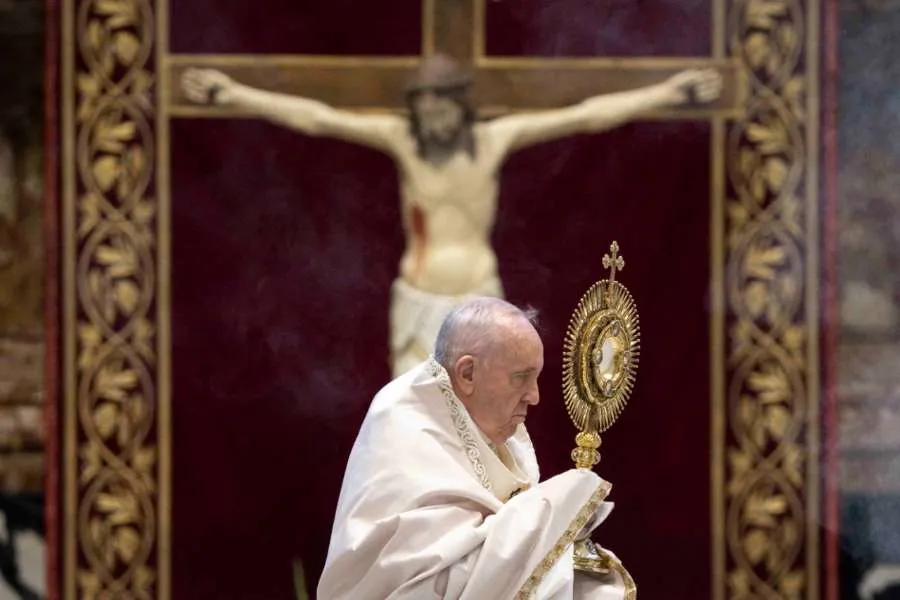Vatican City, 14 June, 2020 / 2:00 pm (ACI Africa).
Here is the full text of Pope Francis' Corpus Christi homily, delivered June 14 at the Basilica of St. Peter.
“Remember all the way which the Lord your God has led you” (Deut 8:2). Today’s Scripture readings begin with this command of Moses: Remember! Shortly afterwards Moses reiterates: “Do not forget the Lord, your God” (v.14). Scripture has been given to us that we might overcome our forgetfulness of God. How important it is to remember this when we pray! As one of the Psalms teaches: “I will call to mind the deeds of the Lord; yes, I will remember your wonders of old” (77:11). But all those wonders too, that the Lord has worked in our own lives.
It is vital to remember the good we have received. If we do not remember it, we become strangers to ourselves, “passers-by” of existence. Without memory, we uproot ourselves from the soil that nourishes us and allow ourselves to be carried away like leaves in the wind. If we do remember, however, we bind ourselves afresh to the strongest of ties; we feel part of a living history, the living experience of a people. Memory is not something private; it is the path that unites us to God and to others. This is why in the Bible the memory of the Lord must be passed on from generation to generation. Fathers are commanded to tell the story to their sons, as we read in a beautiful passage. “When your son asks you in time to come, ‘What is the meaning of the decrees and the statutes and the ordinances which the Lord our God has commanded you?’, then you shall say to your son, ‘We were slaves... [think of the whole history of slavery!], and the Lord showed signs and wonders... before our eyes’” (Deut 6:20-22). You shall hand down this memory to your son.
But there is a problem: what if the chain of transmission of memories is interrupted? And how can we remember what we have only heard, unless we have also experienced it? God knows how difficult it is, he knows how weak our memory is, and he has done something remarkable: he left us a memorial. He did not just leave us words, for it is easy to forget what we hear. He did not just leave us the Scriptures, for it is easy to forget what we read. He did not just leave us signs, for we can forget even what we see. He gave us Food, for it is not easy to forget something we have actually tasted. He left us Bread in which he is truly present, alive and true, with all the flavor of his love. Receiving him we can say: “He is the Lord; he remembers me!” That is why Jesus told us: “Do this in remembrance of me” (1 Cor 11:24). Do! The Eucharist is not simply an act of remembrance; it is a fact: the Lord’s Passover is made present once again for us. In Mass the death and resurrection of Jesus are set before us. Do this in remembrance of me: come together and celebrate the Eucharist as a community, as a people, as a family, in order to remember me. We cannot do without the Eucharist, for it is God’s memorial. And it heals our wounded memory.
The Eucharist first heals our orphaned memory. We are living at a time of great orphanage. The Eucharist heals orphaned memory. So many people have memories marked by a lack of affection and bitter disappointments caused by those who should have given them love and instead orphaned their hearts. We would like to go back and change the past, but we cannot. God, however, can heal these wounds by placing within our memory a greater love: his own love. The Eucharist brings us the Father’s faithful love, which heals our sense of being orphans. It gives us Jesus’ love, which transformed a tomb from an end to a beginning, and in the same way can transform our lives. It fills our hearts with the consoling love of the Holy Spirit, who never leaves us alone and always heals our wounds.






